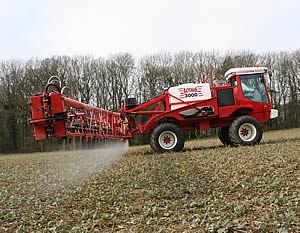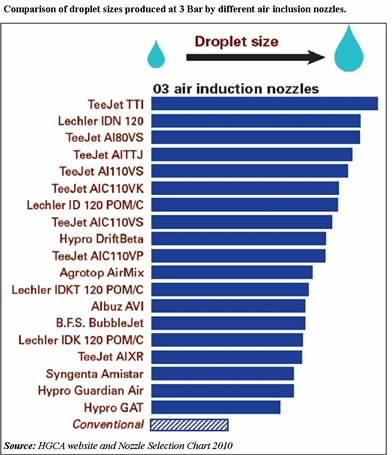 |
|||||||||
|
|||||||||||||||||||
|
|
Droplet Size Details Help Growers with Air Inclusion Nozzle Choice Farmers and contractors looking ahead to this year’s autumn spraying programme and beyond can make more informed choices about which air inclusion (AI) spray nozzles to use thanks to a guidance chart published by HGCA.
For the first time, the new Nozzle Selection Chart highlights differences in the mean droplet size produced by different designs of air inclusion nozzle. “Lack of independent data meant these comparative details have never been published before,” points out Hypro EU product manager Roger James. “It’s something that users should take into account when choosing a nozzle for particular spraying targets and working conditions.” While the previous edition of the chart merely categorised AI nozzles as ‘finer’ and ‘coarser’ it did not identify which designs fell into those categories. The new information, published on the chart and the HGCA website, shows the size of droplet produced by each nozzle relative to a conventional flat fan tip. “Now,” explains Roger James, “if operators want relatively small droplets for a particular application while benefiting from the drift control characteristics of these nozzles, they can see which AI designs will produce them.”
The chart confirms Hypro’s claim that the GuardianAIR nozzle produces the smallest droplet size of any AI tip at typical operating pressures. Its performance is matched only by the Syngenta Amistar nozzle, which is also made by Hypro to the same design but with a different name. The only nozzle on the chart producing smaller droplets is identified as ‘Hypro GAT’. This refers to the GuardianAIR Twin, a new nozzle that has undergone final field evaluation this year before going on sale for the 2011 spraying season. Thanks to the small droplet size produced and the consistent output across a range of pressures, both GuardianAIR tips can be used with confidence for a wide selection of spray treatments, possibly reducing the number of different nozzles an operator needs. “A nozzle making droplets only 15% bigger than those from the GuardianAIR will produce around a third fewer droplets for the same application volume,” Roger James points out. “This loss of coverage has clear implications for the reliable delivery and retention of crop chemicals, especially to small targets, and is likely to make it less suitable for the sort of lower volume applications that help boost sprayer output.” In ideal conditions, a conventional flat fan is still the best option for targets requiring the finest spray, Mr James acknowledges. “But spraying conditions are rarely ideal,” he emphasises. “Operators can use the versatility of the GuardianAIR to spray at normal pressures when conditions are good and then reduce pressure to increase droplet size for optimum drift control when spraying conditions are imperfect.” The HGCA Nozzle Selection Chart can be downloaded from the Crop Research - Spray Technology section of the HGCA.com website.
|
||||||||||||||||||

|
|
||||||||||||||||||
| home | agri-services | pedigree
pen | news | dairy | beef | machinery BPS | property | organisations | site map |
|||||||||||||||||||



